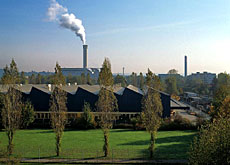Swiss explore CO2 emissions trading

The government is rethinking its policy on cutting greenhouse gas emissions after being told it will not meet its 2010 targets.
One likely option is the introduction of a fuel tax; another possibility is the establishment of a national emissions trading scheme (ETS).
Earlier this month the environment agency told the government that existing measures would not reduce CO2 emissions to ten per cent below 1990 levels.
A tax on fuel now seems inevitable, but the Swiss are also looking into setting up an emissions trading platform similar to a European Union scheme, which is due to start in January 2005.
Firms which exceed emissions targets will be allowed to sell “pollution credits” to those who don’t.
Plans for a similar trading system in Switzerland are underway but are unlikely to become a reality before 2006 at the earliest, according to the environment agency.
“There’s not much awareness among Swiss industry of the possibilities connected to emissions trading,” Andrea Burkhardt of the Swiss environment agency told swissinfo. “It’s a very new instrument and the debate is stuck at an early stage.”
“Of course emissions trading does not replace carbon dioxide measures, but it enables companies to achieve given CO2 targets at a low cost.”
British model
Of particular interest to the Swiss is Britain, which has operated the world’s first national ETS since 2002.
At a meeting in Zurich this week, organised by the British embassy, government and industry representatives heard about Britain’s experiences.
Under the Kyoto Protocol, Britain is committed to reducing greenhouse gases to 12.5 per cent below 1990 levels by 2008-12.
However, the government has set a much more ambitious target of 20 per cent. A recent report even outlined a long-term target of a 60 per cent reduction by 2050.
Britain’s pioneering scheme, which started in April 2002, committed companies to reducing CO2 emissions by almost four million tons by 2006. Participants achieved that level in the first year alone.
EU scheme
Burkhardt said that it would eventually be in Switzerland’s interest to link up with the EU scheme.
“We don’t know how many market players we will have and there’s a danger of market power being exercised by big players. So if we could link up the system and open it up, we would also give Swiss entities the chance to buy and sell at the best prices.”
She added that Switzerland could follow Britain’s lead, for example in offering tax exemptions against CO2 targets.
Greg Dunne of Less Carbon, which advises organisations on greenhouse gas management, said energy efficiency was in a company’s own interest.
“You always make money in reducing your greenhouse gas emissions because you use less energy,” he said. “You invest money but you get it back in reduced energy costs. People in the ETS have saved a fortune.”
Trading system
If Switzerland subsequently embarks on a national trading emissions system, it will raise of host questions: how will carbon dioxide cuts be allocated across the industry; and how will greenhouse gas emissions be noted in company accounts?
In the EU scheme, power companies are included whereas the British trading scheme is open to all sectors of the economy except transport and power sectors.
Like many experts, Burkhardt believes that the issue of carbon trading is here to stay.
“It is a fact that carbon exposure is becoming an asset and companies have to be aware of this exposure because at the end of the day it will reflect on their share prices or the whole corporate value.”
All this presupposes that the Kyoto Protocol will eventually enter into force.
“There is no Plan B,” said Chris Leigh from Britain’s department for environment, food and rural affairs.
swissinfo, Vincent Landon
The Kyoto Protocol was signed in 1997 by more than 180 countries.
It binds industrialised countries to cut greenhouse gas emissions.
The US – the world’s biggest polluter – has refused to ratify Kyoto.
Russia’s ratification would lift the total percentage of CO2 emissions over the 55 per cent threshold, bringing the protocol into force.
Switzerland has pledged to cut carbon dioxide emissions to 10% below 1990 levels by 2010.
But existing measures will only cut emissions by 3.8%, says the Swiss environment agency.
Under existing laws, Switzerland must reduce consumption of all heating fuels by 15% and motor fuels by 8%.
The government is expected to decide by the end of April what sort of fuel tax it will introduce.
Market analysts have predicted that trading of pollution credits across the EU could be worth more than €7 billion (SFr10.9 billion) a year by 2007.

In compliance with the JTI standards
More: SWI swissinfo.ch certified by the Journalism Trust Initiative









You can find an overview of ongoing debates with our journalists here . Please join us!
If you want to start a conversation about a topic raised in this article or want to report factual errors, email us at english@swissinfo.ch.